Seattle Adds People Without Adding Traffic
Population up 21%, traffic down 3.3%, due to good transit. Can Milwaukee learn from this?
Seattle is showing other American cities how transit can help a growing population get around without an increase in car traffic.
The city is growing at a fast pace: Seattle added about 20,000 new residents in 2016, a population increase of about 3 percent. But traffic volumes didn’t increase at all. Driving mileage stayed flat in 2016, Seattle City Traffic Engineer Dongho Chang reports on Twitter.
In doing so, Seattle bucked national and statewide trends. Last year, driving mileage increased 2.9 percent in Washington state and 2.2 percent nationally, according to the Seattle DOT traffic report Chang cited.
The longer-term story is, if anything, even more compelling. Seattle’s population has grown 21 percent since 2006, and vehicle mileage has fallen 3.3 percent over the same period, Chang reports. Meanwhile, transit ridership grew 41.8 percent.
Using transit to absorb the growth of residents and jobs is a feat few peer cities have been able to achieve in the U.S. While transit ridership keeps growing in Seattle, it is stagnating in other cities that spent big on rail transit, like Los Angeles and Denver.
Importantly, Seattle has invested in bus service at the same time as the city pursues rail expansions. King County Metro was facing potential bus cuts due to a budget shortfall in 2014. Rather than accept worse service, Seattle voters added a $60 vehicle registration fee and increased the sales tax by 0.1 percent. The money was used to improve service and increase frequency across the system, especially on the most-used routes.
The Milwaukee County Transit System has seen its ridership plummet, from more than 62 million in 2000 to about 40 million in 2014, a Public Policy Forum study found, and the system’s annual report shows ridership was just over 40 million in 2016. Under former Milwaukee County Executive Scott Walker, funding for the system was steadily cut, along with the number of routes and frequency of rides. To help prevent further declines due to cuts in state transportation funding, Milwaukee County Executive Chris Abele proposed an increase in the county wheel tax or vehicle registration fee, but the county board, led by board chair Theo Lipscomb, voted against the proposal.
The reward for Seattle from spending more on transit can be seen in pattern of shifting travel habits among downtown workers: Transit commuting is on the rise while car commuting is not.
The share of downtown Seattle workers commuting by car dropped from 35 percent to 30 percent since 2010. Seattle’s downtown added 45,000 workers over that period, with 95 percent of the new trips were absorbed by transit, walking, biking or carpooling, according to the local non-profit Commute Seattle.
Earlier this year, Streetfilms and TransitCenter looked at how Seattle’s investments in bus and rail service set the stage for this transition:
More major improvements to Seattle transit are coming. In 2016, the region passed a $54 billion tax package to expand light rail, add bus rapid transit routes, and plan for transit-oriented development.
Seattle’s continuing growth in transit ridership is a credit to the leadership of public officials like Dongho Chang, as well as voters’ willingness to pay for better transit. Other cities should be taking notes.
Story by Angie Schmitt with additional contributions from Urban Milwaukee. A version of this story originally ran on Streetsblog. Angie Schmitt is a newspaper reporter-turned planner/advocate who manages the Streetsblog Network from glamorous Cleveland, Ohio. She also writes about urban issues particular to the industrial Midwest at Rustwire.com.
Streetsblog
-
Car Culture Cements Suburban Politics
![Sprawl. Photo by David Shankbone (David Shankbone) [GFDL (http://www.gnu.org/copyleft/fdl.html) or CC-BY-SA-3.0 (http://creativecommons.org/licenses/by-sa/3.0/)], via Wikimedia Commons [ https://commons.wikimedia.org/wiki/File%3ASuburbia_by_David_Shankbone.jpg ]](https://urbanmilwaukee.com/wp-content/uploads/2017/10/1024px-Suburbia_by_David_Shankbone-185x122.jpg) Nov 23rd, 2018 by Angie Schmitt
Nov 23rd, 2018 by Angie Schmitt
-
Most Drivers Don’t Yield to Pedestrians
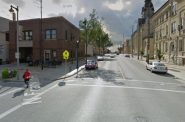 Mar 22nd, 2018 by Angie Schmitt
Mar 22nd, 2018 by Angie Schmitt
-
Jobs Up Yet Driving Down in Seattle
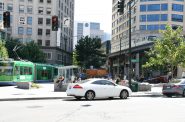 Feb 22nd, 2018 by Angie Schmitt
Feb 22nd, 2018 by Angie Schmitt
Transportation
-
MCTS Adds 28 New Buses
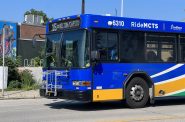 Jul 13th, 2024 by Graham Kilmer
Jul 13th, 2024 by Graham Kilmer
-
MCTS Designing New Bus Shelters
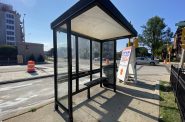 Jul 10th, 2024 by Graham Kilmer
Jul 10th, 2024 by Graham Kilmer
-
MCTS Updates RNC Bus Detours To Better Serve Downtown, Riders
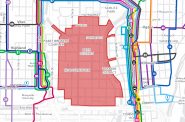 Jul 9th, 2024 by Jeramey Jannene
Jul 9th, 2024 by Jeramey Jannene


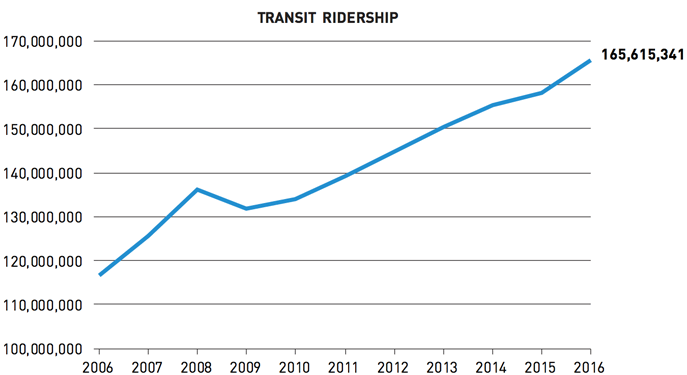
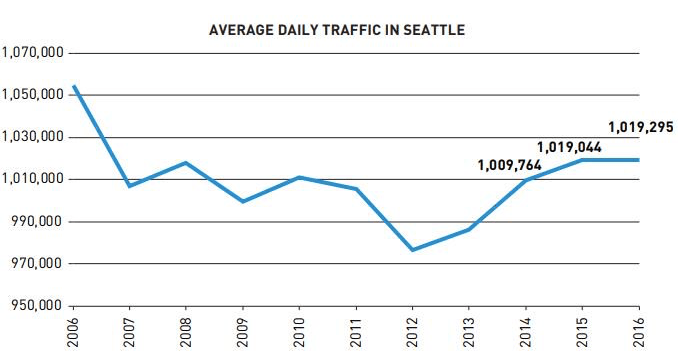
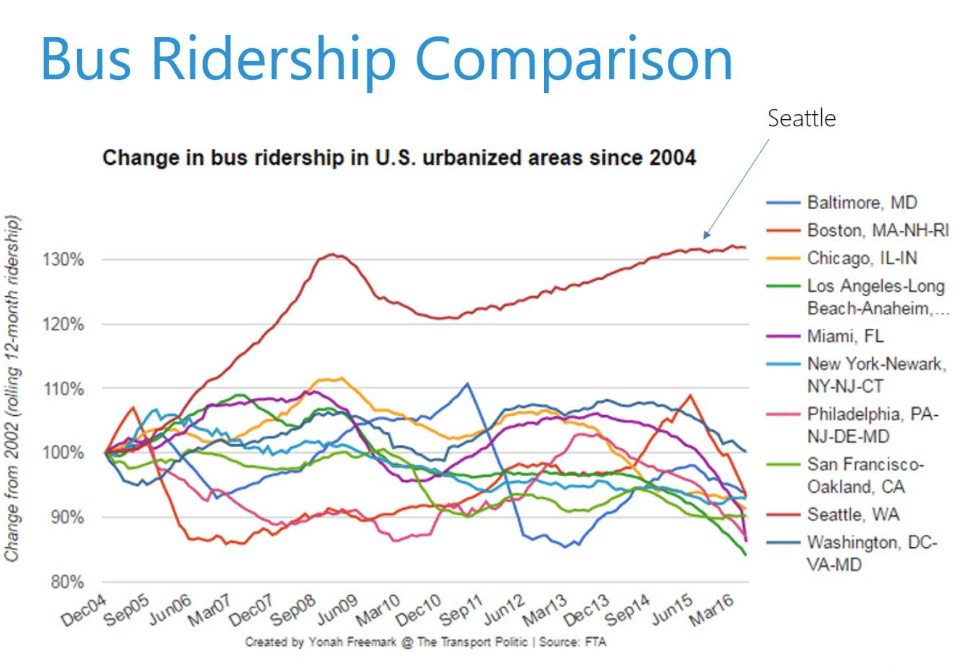



















Born and raised in Seattle. It is a beautiful, very progressive boomtown with an ultra-thriving economy, a great business and entrepreneur friendly environment and cosmopolitan culture. Traffic is a nightmare these days. I rode my bike everywhere until I was forced to move (unfortunately) to Wississippi. Bertha was/is a giant boondoggle. You can’t get anywhere in a car because of the geography, stuck between Puget Sound, two large lakes and two mountain ranges. It’s a nightmare. The real problem is however, nobody except the mega rich can afford to live there anymore! Tesla’s, Buggattis, Ferraris abound. You see them parked outside the high tech start ups and outside the legal cannabis shops all the time. It is just a playground for the mega rich now. It is what they call an “Imperial City” now. Seattle was a lot like Minneapolis or Milwaukee 30 years ago. Now it couldn’t be further from Milwaukee or any midworst city. Seattle is more like a Monaco, Hong Kong or Dubai these days. The city has more millenials with access to at least 250 million dollars than anywhere else in the country! They didn’t earn it. They ingerited it! Billionaires like Bezos, Gates Schultz and Allen abound. All this said, if you can afford it and you want to live in your car and make 100k a year you can in Seattle! Go west young people, go west!
This is a very misleading article. Traffic (time spent in traffic) is getting worse in Seattle. Clearly this author has never actually been to Seattle. Traffic is HORRIBLE there. Ask anyone who lives there. Or just look up traffic stats per city, it is the 4th or 5th worst city for traffic in the US. Maybe show a graph that shows average commute time (rather than vehicle mileage) over the span that the mass transit was added and then see if you can make the case that the trains are alleviating traffic.
Nobody cares how many miles cars drive, they care how long it takes to get somewhere.
Regardless of what is going on in Seattle, we are plagued by right wing demagogues who trash anything have to do with mass transit. Fortunately, we have some progressive leaders such as Barrett, Abele, and Baumann who look beyond the right wing rhetoric of talk radio and local politicians. The biggest obstacle to mass transit, and the person that has cost the state hundreds of millions for ignorant political decisions, is sitting in Madison. Walker must go. I hope the wave that is building sends his *ss packing next November.
Word up Tom! Operation DUMP WALKER 2018!! has been engaged! He and all republicans in the state are getting the boot!! All aboard the DumpWalkerMobile!! Whoops! Looks like we just ran over “The AntiTerry” no worries…Next stop, freedom from republican tyranny!
Regarding the data…..
It’s not clear the numbers add up to your conclusion. You contrast traffic mileage with a percentage of bus ridership. So there is no way of knowing if the gross number of people taking the bus is significant enough to figure into your conclusion.
A better way would be to compare trips across modes of transportation. I think the census looks into how people get to work, for example.
The author could have mentioned that the employees of Milwaukee County stole the Goose that laid the golden eggs. Scott Walker had nothing to due with the lavished retirements that out raged the citizens of Milwaukee County. Milwaukee County employees had no shame. They took million dollar bonuses passed on by their County board friends. Walker cut transportation because county workers walked away with the County treasury.
All of these people commenting about how bad the traffic still is in Seattle. That’s because of how many people are moving there, if even MORE of those people choose to ride the bus the traffic wouldn’t be as bad. Imagine what traffic would be like if that population increase happened without a transit ridership increase!
You know who doesn’t care about traffic? A person riding their bike to work.
My understanding is a lot of the residence of Seattle do not like the fact that their Fortune 500 companies are welcoming new people to Seattle. Milwaukee has little in comparison to Amazon, Microsoft and Starbucks as headquarters. It s to bad Milwaukee did not do more to get Fox Conn. Having 10 to 20 thousand new workers around downtown Milwaukee would benefit the Trolley.
@Troll, just like career politician Scott “Big Government Moocher” Walker, who has never worked a day in his life in the private sector or free market, is walking away with taxpayer’s dollars! We should drug test this mooching charlatan just as he wants to drug test the poor for food. Taxpayer’s dollars are a sacred trust and mooching Scott Walker is a public servant. He clearly isn’t well. Who knows what he could be on?! Giving 3 Billion in taxpayer’s money to a Taiwainess, ahem, Chinese company smacks of mental instability to any actual successfull business person. He should be drug tested. If he doesn’t agree, What does he have to hide?
What does that mean Terry, tax payers money is a sacred trust? Is that a Marxist way of saying that you the individual- your hard work is all the peoples hard work. You must work in the public sector. Are you one of those County employees with over a hundred sick days. It must be nice to just throw the tax payers money around. Lets throw expensive solar panels on every County building and bill it to those private sector suckers that work til dusk to dawn. Then Chumps like you, Terry can feel all proud that some solar panel that gives back a pittance in energy is saving the planet.
@troll, No wrong. I am a life long successful entrepreneur and businessperson. I have never worked for nor taken a dime from the public sector. A “sacred trust” means that it is our money, the taxpayer’s and that it should not be squandered by career politicians and life long Big Government moochers like Scott Walker who has never worked a day in the private sector or free marke. Instead he been sucking off the government dole for decades. Make sense yet?
@Troll, Your assumptions about me are 100% wrong. I have no idea why you are blathering about solar panels or Marxism? You are not making sense. You might want to check your carbon monoxide detectors. I think you might have a leak!
Anyways, so sorry but resorting to anonymous insults, ad hominem attacks and name calling doesn’t work with me. All it does it show the entire world, that it is YOU who is the “chump.”
This is a fantastic article and reaffirms what many transportation advocates have been saying. Very helpful.
@David Almost. Stuck traffic makes angry drivers that run over cyclists. So, a correction:
May someone who has lived in both Milwaukee and Seattle weigh in?
The data used by the author represents only the city of Seattle (population 704,000, 84 square miles), not King County (population 2,150,000, 2,300 square miles.) Two adjoining counties, Pierce and Snohomish, each have populations over one million.
Like Madison, the city of Seattle is an isthmus, so natural barriers pushed much of recent growth outward. Commenter #1 Terry, exaggerates a bit; most city residents are not tech squillionaires, nor is my neighborhood pot shop surrounded by Ferraris, though my real-estate salesman neighbor has splurged for a Tesla. People here are ambivalent about our boom-town status; they like the growth and all the good things that accrue, but feel that the old live-and-let live Seattle is being lost.
Over the last twenty-five years residents of the three-county region have voted regularly to expand heavy rail, light rail, rapid-ride buses, and bikeways. But so far most of the benefits of transit expansion have gone to the cities of Seattle and Tacoma. Train and bus service in, and into the cities is fine, and ridership numbers beat projections. But in the suburbs cars rule – thus commenter #2, LT, is quite right. Oh, and for every new city resident you can bet there’s an equivalent number or more settling in a distant suburb.
Seattle, like Milwaukee, cannot depend on state government for much help; the same anti-transit arguments are made here as in Madison by politicians who, I guess, travel by sedan chair. So I would urge Milwaukeeans to persevere. Despite a lot of anti-city nonsense spouted here and in the statehouse, you are still the engine that drives the Wisconsin train.
I lived in Milwaukee most of my life but have lived in Seattle the last few years. As others have said the traffic congestion is terrible. 4th or 5th worst in the country. Lots of folks have 45-60 min commutes.
That said, it is an issue due to lack of space and the continued population boom. The growth here is staggering and the existing infrastructure can’t support it.
Transit increase is almost due to necessity. More folks are biking too as they can get to work faster that way. It also helps that a lot of the population gain is downtown so then it’s easier to bike/walk or ride the bus. For folks outside the downtown core bus service is adequate but light rail is still 10-15 years away.
Milwaukee doesn’t have this issue and may never. The traffic isn’t that bad so you’re not forced to use transit or bike/walk.
I am pro transit and voted for the 54 billion tax here but be glad MKE growth and traffic aren’t that bad. The MKE street car and expansion lines should help the downtown core and visitors but most other folks are fine driving
@Ms Anne Thrope, cute name however, I don’t exaggerate at all. I stand by my comments. Why? The entire neighborhood I grew up in including my childhood home and.my successful businesses were demolished and the entire neighborhood renamed by Vulcan and other corporate intetests! You clearly lived out in the sticks. I grew up in the city, in what was known as the Cascade for over 100 years. Vulcan and Amazon came in, bulldozed the entire single family home, working class neighborhood and now it’s all just a glass and steel developments, Amazon with 50k employees from out pf state, crappy condoes, high rent, low class yuppie ghetto. I still go there all the time for business and to visit family and friends but it’s nice to leave now. You clearly don’t pass by the lower Queen Anne cannabis shop or Leaf and Paper on Bainbridge Island, because sorry, Ferraris, Teslas and Bugattis abound! The solution in Seattle for me in terms of transportation was easy, get a bike and ride, ride ride. For the elderly, sick or disabled this is not an option. In my opinion, Seattle transit went down the tubes the moment they got rid of the “free” bus in downtown and the 178 express to the airport. The “free” bus zone downtown was actually very cool and progressive. You could ride the electric trolley busses all over downtown. Ever since that ended, it’s been a disaster. I guess tje “free” part didn’t work out. Bertha is a total boondoggle, you couldn’t even move by the waterfront for years! Seattle is nowhere near as cool as it was 20-30 years ago. With all the Amazombies and Brogrammers everywhere but hey times change. The rich people love it!
PS
They renamed my neighborhood “South Lake Union” but it will always be the Cascade to me! I am the one that got the city to put the Cascade signs back up after they tore them down, right before I left town for good!
Terry,
Lifelong Seattleite, still here. Your hyperbole is astounding. There were no single family homes in slu it was all light industrial and sleepy retail. Cascade hardly had single family homes in last, what, 60 years? Mercer was always a mess. The growth is a challenge to be sure but if u were here for the boeing bust (i have to rely on my parents experience) u take a growing, dynamic economy anyday. Ferraris everywhere? Please.